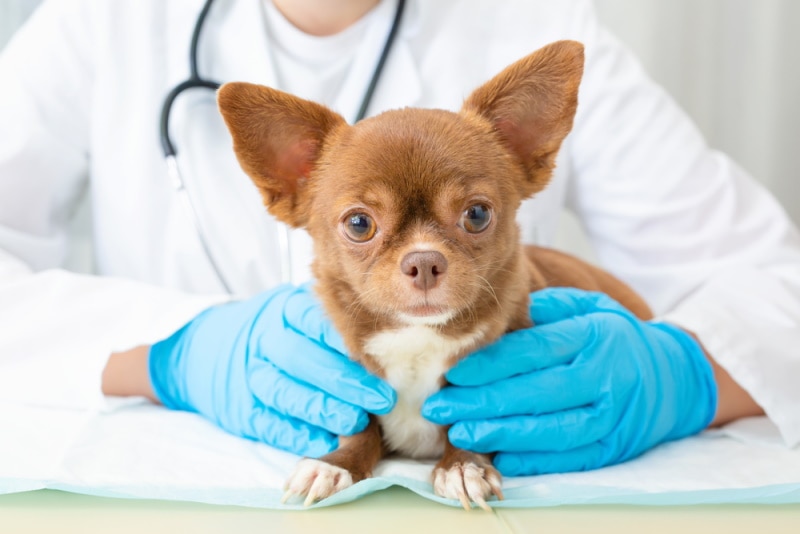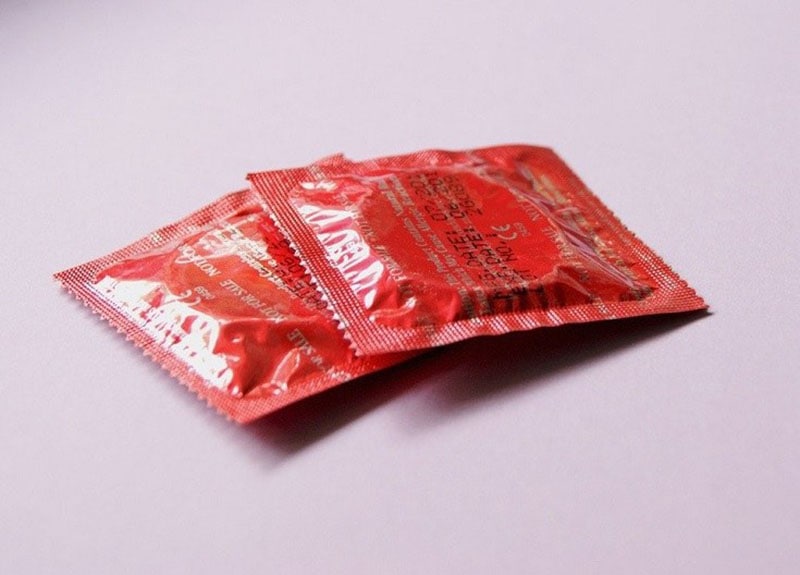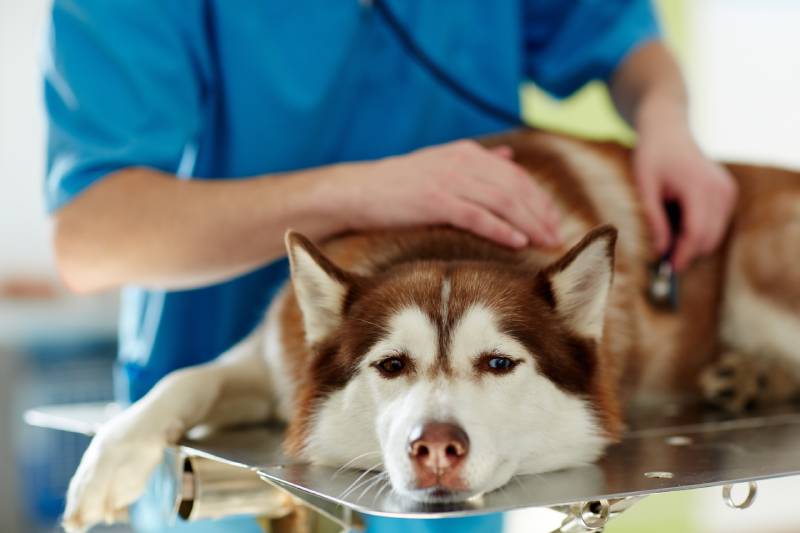Click to Skip Ahead
Loving your dog means more than petting them and giving them kisses. It also involves duties like deworming them and taking them to the vet regularly. There’s also the fact that if your dog is not dewormed and has fleas or ticks, they can make you sick.
Therefore, deworming and applying antiparasitic products (for fleas and ticks), are essential aspects of dog ownership that should not be neglected, both for your dog’s health and for yours and your family members’.
In this article, learn about the deworming schedule for puppies, the most common intestinal parasites in dogs, the clinical signs of worm infestations, and more.

What Is the Schedule for Deworming Puppies?
Deworming refers to the administration of an antiparasitic drug to kill intestinal parasites in dogs, such as roundworms, tapeworms, hookworms, whipworms, and giardia.
The dosage and frequency of deworming depend on the weight of your dog, their age, their lifestyle, and the type of parasites they have.
- Tablets
- Chewable tablets
- Syrup
- Topical (spot-on)
Your vet will create a deworming plan for your puppy based on their background and lifestyle. Generally speaking, deworming in puppies is generally done at 2, 4, 6, 8, 10, and 12 weeks of life (that is, every 2 weeks until your puppy reaches approximately the age of 12 weeks). After this, you should deworm them once every 1–4 months.
Pregnant females can also be infested with parasites and should be treated during pregnancy with safe products. Without proper deworming of the mother, intestinal parasites will be transmitted to the pups via the intrauterine or trans-mammary route. Puppies infested in this way can be dewormed from the age of 2 weeks with special products.

What Is the Schedule for Deworming Adult Dogs?
In adult dogs, deworming should be done once every 1–4 months. For general deworming, one treatment is sufficient, but for confirmed infestations, the process will likely need to be repeated after 14 days. These products only kill the adult parasites; they generally have no effect on eggs and larvae. In 10–14 days, the larvae have time to develop into adults and to be killed by the drug.
How Long Does It Take for the Worms to Be Eliminated After Deworming?
After you have given your puppy the deworming treatment, they will eliminate the dead worms within 2–14 hours. However, there are cases in which infested dogs will eliminate dead worms up to a week after the deworming treatment.

How Do Dogs Get Infested With Intestinal Parasites?
There are many means by which dogs can become infested with intestinal parasites.
- Contaminated soil or cohabitation with other infested animals and contact with feces from infested animals. A common situation with dogs is that when they go out for their daily walk and notice the feces of other animals, their first instinct is to approach and smell them. If the feces of the other animals contain worm eggs, your dog will become infested if they eat the feces or step in them and then lick their paws to clean themselves.
- External parasites.For example, fleas can transmit tapeworms. Annoyed by the discomfort that fleas cause, pets will use their teeth in an attempt to get rid of these pests and scratch themselves. In this situation, dogs can accidentally swallow fleas (contaminated with tapeworm larvae) and become infested.
- Infested dog females, before mating or in pregnancy.They can transmit these parasites to their puppies. Intestinal worms can cross the placenta, and pups can be born already infested. Also, roundworms and hookworms can be passed through milk, and the puppies will become infested when they nurse.
- Raw or undercooked meat. This is often a cause of infestation with intestinal parasites.
- Hunting. If your dog eats small prey such as rodents, rabbits, or birds that are hosts of parasites, they can get infected by parasitic forms inside them, which continue the life cycle in your dog’s intestine.
What Intestinal Parasites Are Puppies Susceptible To?
Intestinal parasites are not limited to intestinal worms; they also include protozoa.
- Tapeworms (Dipylidium caninum, Echinococcus, and Taenia species) — These parasites can be recognized when the infested dog eliminates parts of them (segments) along with the feces.
- Roundworms (Toxocara canisand Toxascaris leonina) — They can be up to 7–12 centimeters long and feed on the nutrients that your dog eats.
- Hookworms (Ancylostoma caninum, Ancylostoma braziliense, and Uncinaria stenocephala) —These worms attach to the wall of your dog’s small intestine and feed on blood and proteins. If they migrate to the lungs, they can lead to clinical signs of pneumonia. You have to be careful with these types of worms because their larvae can burrow into human skin (usually through bare feet).
- Whipworms (Trichuris vulpis) —These worms live in the dog’s large intestine. Dogs eliminate eggs for long periods of time and larvae can develop inside the egg and survive inside it for years in the environment.
- Protozoa (Giardia spp.) — Giardia is a flagellated protozoan, which lives and multiplies in the intestine. It has two forms: vegetative (trophozoite) and cystic. Giardia cysts are vital to deal with because through them, Giardia is transmitted from one host to another. It can also be transmitted to humans.

What Are the Clinical Signs of Intestinal Parasites in Puppies?

The diagnosis is generally based on the clinical signs. If you want a definite diagnosis, a fecal examination is essential.
- The presence of worms or worm segments in the feces (eggs are microscopic and cannot be seen with the naked eye; the same is true for Giardia)
- Distended (bloated) abdomen
- Weight loss (your dog has an appetite and eats but loses weight)
- Anemia (pale color of mucous membranes)
- Diarrhea
- Vomiting
- Nausea
- Fatigue
- Itching in the anal area
- Lethargy
- Apathy
- Matted fur
- Dull or brittle coat
Frequently Asked Questions
Does Deworming Have Side Effects?
Most deworming products are safe, with a wide margin of safety and limited adverse effects. Some dogs may experience vomiting and/or diarrhea after deworming, but this will disappear within 24–48 hours. In the case of massive infestations, the treatment will kill a large number of parasites, and negative effects like vomiting, diarrhea, loss of appetite, etc., may occur. In this case, it is recommended to consult the veterinarian before administering the treatment.

Does Deworming Prevent Future Infestations?
No, deworming only treats current infestations and can’t prevent future episodes. Your dog can become infested with parasites even if they are freshly dewormed. That is why it is recommended to deworm your pet regularly every 1–4 months.

Conclusion
Puppies are recommended to be dewormed starting at the age of 2 weeks, and the treatment will need to be repeated every 2 weeks until your dog is approximately 12 weeks old. After this period, dogs should be dewormed once every 1–4 months, depending on many factors that your vet will assess. Deworming does not prevent infestations with intestinal parasites; it only treats them. Therefore, your dog can become infested with intestinal parasites even if they are freshly dewormed.
Clinical signs of intestinal parasite infestation include a distended abdomen, vomiting, diarrhea, anemia, weight loss, and poor quality coat. In certain infestations, pets may also vomit worms. If this is also the case with your dog, consult your veterinarian.
- See also: Do Cats Hibernate? Reasons & Tips
Featured Image Credit: OLESYA BOLTENKOVA, Shutterstock












